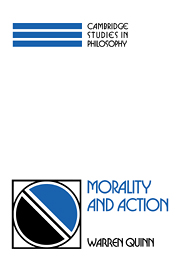Book contents
- Frontmatter
- Contents
- Acknowledgments
- Introduction
- 1 Moral and other realisms: Some initial difficulties
- 2 Abortion: Identity and loss
- 3 The right to threaten and the right to punish
- 4 Reply to Brook
- 5 Truth and explanation in ethics
- 6 Reflection and the loss of moral knowledge: Williams on objectivity
- 7 Actions, intentions, and consequences: The Doctrine of Doing and Allowing
- 8 Actions, intentions, and consequences: The Doctrine of Double Effect
- 9 Reply to Boyle's “Who is entitled to Double Effect?”
- 10 The puzzle of the self-torturer
- 11 Rationality and the human good
- 12 Putting rationality in its place
6 - Reflection and the loss of moral knowledge: Williams on objectivity
Published online by Cambridge University Press: 05 June 2012
- Frontmatter
- Contents
- Acknowledgments
- Introduction
- 1 Moral and other realisms: Some initial difficulties
- 2 Abortion: Identity and loss
- 3 The right to threaten and the right to punish
- 4 Reply to Brook
- 5 Truth and explanation in ethics
- 6 Reflection and the loss of moral knowledge: Williams on objectivity
- 7 Actions, intentions, and consequences: The Doctrine of Doing and Allowing
- 8 Actions, intentions, and consequences: The Doctrine of Double Effect
- 9 Reply to Boyle's “Who is entitled to Double Effect?”
- 10 The puzzle of the self-torturer
- 11 Rationality and the human good
- 12 Putting rationality in its place
Summary
In Ethics and the Limits of Philosophy Bernard Williams surveys a wide variety of important moral topics. He looks back to Aristotle and Kant, freeing their views from various controversial metaphysical assumptions and examining what remains plausible in their grand attempts to ground morality in reason. He casts a critical eye on the most influential contemporary views, utilitarianism (chiefly as developed by Hare) and Rawlsian contractualism. And he raises important general questions about the proper nature and limits of moral theory – its form, its relation to pretheoretical intuition, and the role that linguistic analysis can play in it. In all this, Williams is largely skeptical. Of the great historical projects, he thinks only the Aristotelian might be successfully completed, and even here he regards the chance as slim. He has, moreover, little hope for the kind of streamlined ethical theory that contemporary moral philosophers hanker after and as little confidence in linguistic analysis as a moral methodology.
The culmination of this line of critical thought comes in Chapter 8, “Knowledge, Science and Convergence.” There Williams argues, pace Socrates, that philosophy not only cannot create new moral knowledge of its own, it actually destroys the only real moral knowledge that human beings can have. That is the knowledge they inherit as members of particular traditional cultures, or of modern cultures in which certain traditional moral notions have survived. In short, ethics is objective only when it is philosophically naive.
- Type
- Chapter
- Information
- Morality and Action , pp. 134 - 148Publisher: Cambridge University PressPrint publication year: 1994
- 1
- Cited by



